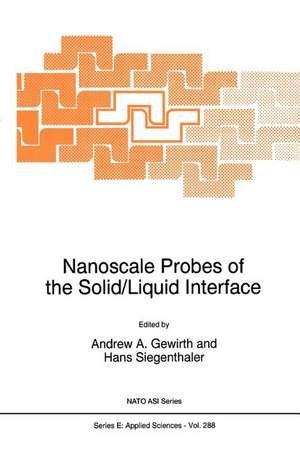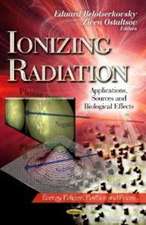Nanoscale Probes of the Solid/Liquid Interface: NATO Science Series E:, cartea 288
Editat de Andrew A. Gewirth, H. Siegenthaleren Limba Engleză Paperback – 7 dec 2010
Scanning probe microscopy (the collective term for such instruments as the STM, the atomic force microscope and related instrumentation) allows detailed, real space atomic or lattice scale insight into surface structures, information which is ideally correlated with surface reactivity. The use of SPM methods is not restricted to ultrahigh vacuum: the STM and AFM have been used on samples immersed in solution or in ambient air, thus permitting a study of environmental effects on surfaces. At the solid--liquid interface the reactivity derives precisely from the presence of the solution and, in many cases, the application of an external potential.
Topics covered in the present volume include: the advantages of studying the solid--liquid interface and the obtaining of additional information from probe measurements; interrelationships between probe tip, the interface and the tunnelling process; STM measurements on semiconductor surfaces; the scanning electrochemical microscope, AFM and the solid--liquid interface; surface X-ray scattering; cluster formation on graphite electrodes; Cu deposition on Au surfaces; macroscopic events following Cu deposition; deposition of small metallic clusters on carbon; overpotential deposition of metals; underpotential deposition; STM on nanoscale ceramic superlattices; reconstruction events on Au(ijk) surfaces; Au surface reconstructions; friction force measurements on graphite steps under potential control; and the biocompatibility of materials.
| Toate formatele și edițiile | Preț | Express |
|---|---|---|
| Paperback (1) | 1219.46 lei 6-8 săpt. | |
| SPRINGER NETHERLANDS – 7 dec 2010 | 1219.46 lei 6-8 săpt. | |
| Hardback (1) | 1225.62 lei 6-8 săpt. | |
| SPRINGER NETHERLANDS – 30 apr 1995 | 1225.62 lei 6-8 săpt. |
Din seria NATO Science Series E:
- 24%
 Preț: 1570.65 lei
Preț: 1570.65 lei -
 Preț: 397.76 lei
Preț: 397.76 lei -
 Preț: 386.81 lei
Preț: 386.81 lei - 20%
 Preț: 346.24 lei
Preț: 346.24 lei -
 Preț: 424.33 lei
Preț: 424.33 lei - 18%
 Preț: 1224.18 lei
Preț: 1224.18 lei - 18%
 Preț: 1836.63 lei
Preț: 1836.63 lei - 18%
 Preț: 1229.28 lei
Preț: 1229.28 lei -
 Preț: 381.00 lei
Preț: 381.00 lei -
 Preț: 409.30 lei
Preț: 409.30 lei - 18%
 Preț: 1841.36 lei
Preț: 1841.36 lei - 5%
 Preț: 367.28 lei
Preț: 367.28 lei -
 Preț: 407.19 lei
Preț: 407.19 lei - 18%
 Preț: 1838.38 lei
Preț: 1838.38 lei -
 Preț: 420.28 lei
Preț: 420.28 lei -
 Preț: 399.29 lei
Preț: 399.29 lei -
 Preț: 398.74 lei
Preț: 398.74 lei - 18%
 Preț: 3026.13 lei
Preț: 3026.13 lei -
 Preț: 388.90 lei
Preț: 388.90 lei - 5%
 Preț: 391.06 lei
Preț: 391.06 lei - 18%
 Preț: 1228.62 lei
Preț: 1228.62 lei - 18%
 Preț: 1229.73 lei
Preț: 1229.73 lei - 18%
 Preț: 1234.46 lei
Preț: 1234.46 lei - 5%
 Preț: 3532.05 lei
Preț: 3532.05 lei - 18%
 Preț: 1840.11 lei
Preț: 1840.11 lei - 5%
 Preț: 378.80 lei
Preț: 378.80 lei - 18%
 Preț: 1227.84 lei
Preț: 1227.84 lei -
 Preț: 392.75 lei
Preț: 392.75 lei -
 Preț: 395.63 lei
Preț: 395.63 lei - 18%
 Preț: 2489.30 lei
Preț: 2489.30 lei - 5%
 Preț: 1429.27 lei
Preț: 1429.27 lei -
 Preț: 396.02 lei
Preț: 396.02 lei - 5%
 Preț: 2142.61 lei
Preț: 2142.61 lei - 18%
 Preț: 3049.16 lei
Preț: 3049.16 lei - 18%
 Preț: 1844.54 lei
Preț: 1844.54 lei -
 Preț: 403.53 lei
Preț: 403.53 lei
Preț: 1219.46 lei
Preț vechi: 1487.15 lei
-18% Nou
Puncte Express: 1829
Preț estimativ în valută:
233.36€ • 241.10$ • 194.12£
233.36€ • 241.10$ • 194.12£
Carte tipărită la comandă
Livrare economică 19 martie-02 aprilie
Preluare comenzi: 021 569.72.76
Specificații
ISBN-13: 9789048145416
ISBN-10: 9048145414
Pagini: 356
Ilustrații: XVI, 334 p.
Dimensiuni: 155 x 235 x 19 mm
Greutate: 0.49 kg
Ediția:Softcover reprint of the original 1st ed. 1995
Editura: SPRINGER NETHERLANDS
Colecția Springer
Seria NATO Science Series E:
Locul publicării:Dordrecht, Netherlands
ISBN-10: 9048145414
Pagini: 356
Ilustrații: XVI, 334 p.
Dimensiuni: 155 x 235 x 19 mm
Greutate: 0.49 kg
Ediția:Softcover reprint of the original 1st ed. 1995
Editura: SPRINGER NETHERLANDS
Colecția Springer
Seria NATO Science Series E:
Locul publicării:Dordrecht, Netherlands
Public țintă
ResearchCuprins
1. Solid-Liquid: The Interface of the Future.- 2. The Metal-Solution Interface in the STM-configuration.- 3. Electron Tunneling in Electrochemical STM.- 4. In situ Scanning Tunneling Microscopy in Semiconductor Electrochemistry.- 5. A Description of the Scanning Electrochemical Microscope (SECM) and of its Applications.- 6. AFM Studies of Copper Solid-Liquid Interfaces.- 7. Surface X-Ray Scattering and Scanning Tunneling Microscopy Studies at the AU(111) Electrode.- 8. Cluster Formation and Dissolution on Electrode Surfaces.- 9. The Initial Stages of Electrolytic Copper Deposition: an Atomistic View.- 10. Scanning Probe Microscope Studies of Copper Electrodeposition.- 11. Electrochemical Deposition of Metal Nano-Disk Structures using the Scanning Tunneling Microscope.- 12. Fundamentals of Electrodeposition of Metals.- 13. Electrochemical and in situ STM Studies of UPD and OPD of Metals in Different Model Systems.- 14. Real-Space Imaging of Nanoscale Electrodeposited Ceramic Superlattices in the Scanning Tunneling Microscope.- 15. The Surface Structure of Gold Single-Crystal Electrodes.- 16. Harmony of Electrochemical Results, in situ STM Observations and in situ SXRS Data, at Gold Faces — Aqueous Solution Interfaces.- 17. Friction Force Measurements on Graphite Steps under Potential Control.- 18. Nanoscale Probing of Biocompatibility of Materials.












